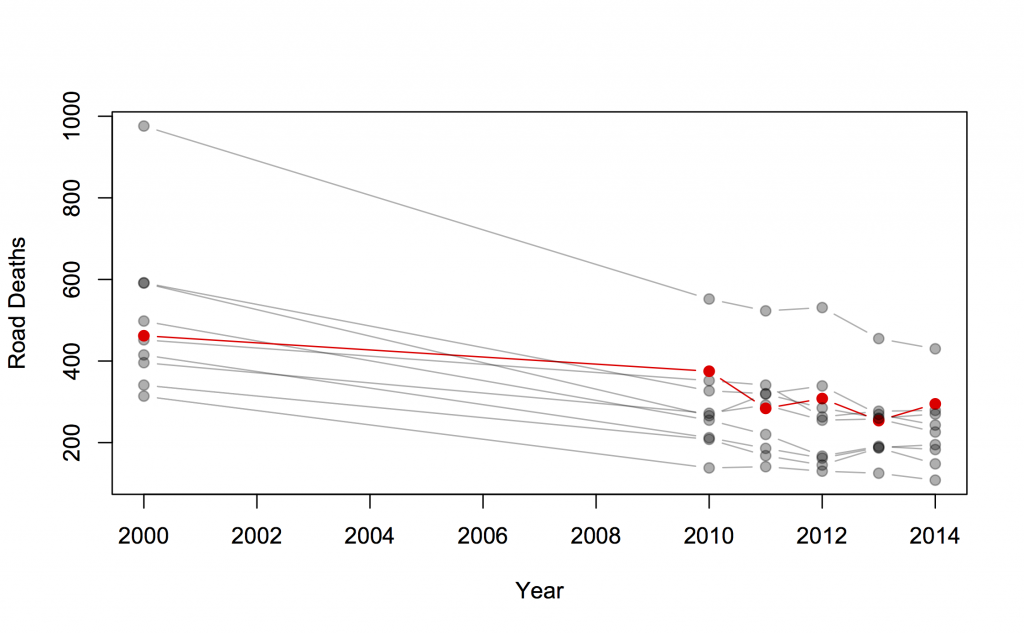Road deaths up (maybe)
“In Australia road deaths are going down but in New Zealand the number has shot up“, says the Herald, giving depressing-looking international comparisons from newly-announced OECD data. The percentage increase was highest in New Zealand The story does go on to point out that the increase reverses a decrease the previous year, suggesting that it might be that 2013 was especially good, and says
“An ITF spokesman said New Zealand’s relatively small size made percentage movements more dramatic.”
Overall, it’s a good piece. Two things I want to add: first, it’s almost always useful to see more context in a time series if it’s available. I took the International Road Traffic Accident Database and picked out a group of countries with similar road toll to New Zealand in 2000: all those between 200 and 1000. The list is Austria, Denmark, Finland, Ireland, Israel, New Zealand, Norway, Slovenia, Sweden, Switzerland. Here are the data for 2000 and for 2010-2014; New Zealand is in red.
There’s a general downward trend, but quite a bit of bouncing around due to random variation. As we keep pointing out, there are lots of mistakes made when driving, and it takes bad luck to make one of these fatal, so there is a lot of chance involved. It’s clear from the graph that the increase is not much larger than random variation.
Calculations using the Poisson distribution (the simplest reasonable mathematical model, and the one with the smallest random variation) are, likewise, borderline. There’s only weak evidence that road risk was higher last year than in 2013. The right reference level, though, isn’t ‘no change’, it’s the sort of decrease that other countries are seeing. The median change in this group of 10 countries was a 5% decrease, and there’s pretty good evidence that New Zealand’s risk did not decrease 5%. Also, the increase is still present this year, making it more convincing.
What we can’t really do is explain why. As the Herald story says, some of the international decrease is economic: driving costs money, so people do less of it in recessions. Since New Zealand was less badly hit by recession, you’d expect less decrease in driving here, and so less decrease in road deaths. Maybe.
One thing we do know: while it’s tempting and would be poetic justice, it’s not valid to use the increase as evidence that recent road-safety rule changes have been ineffective. That would be just as dishonest as the claims for visible success of the speed tolerance rules in the past.
Thomas Lumley (@tslumley) is Professor of Biostatistics at the University of Auckland. His research interests include semiparametric models, survey sampling, statistical computing, foundations of statistics, and whatever methodological problems his medical collaborators come up with. He also blogs at Biased and Inefficient See all posts by Thomas Lumley »

More deaths this year than last year is what it means for deaths to have gone up. The poisson rate parameter doesn’t exist.
10 years ago
I said there was uncertainty about whether *risk* had gone up. That’s not the same.
I don’t know what you mean about the Poisson parameter. I assume you’re not saying that statements about average risk are intrinsically meaningless.
The point of the Poisson approximation to the likelihood or to the sampling distribution is that it almost certainly has smaller variance than a more realistic model, and so will tend to overestimate the strength of evidence for change in risk. If the evidence is weak under a Poisson model, it will be weak under any reasonable model, so that’s a useful screen.
The poisson rate parameter, I would have said, has the same metaphysical status as any parameter in a statistical model. It exists just as much as it usually does.
10 years ago
Yeah, I was just being snarky. :-) The following is pedantic clarification.
“I assume you’re not saying that statements about average risk are intrinsically meaningless.”
No, they can be made meaningful with clarification of what kind of average you’re talking about and what ‘risk’ means.
“The poisson rate parameter, I would have said, has the same metaphysical status as any parameter in a statistical model. It exists just as much as it usually does.”
Yeah. In some applications parameters exist fairly literally and in others they’re just ways of organising your thoughts.
10 years ago
The international comparison uses rates per 100k inhabitants (in the pictures at least). I assume that denominator was chosen because it’s easy to obtain and defensible. It would be interesting, though, to compare rates per person-km driven which is probably a better measure of exposure. E.g., I would hypothesize that a typical U.S. driver does a lot more of it than a typical U.K. driver.
10 years ago
Yes, that would definitely be better for international comparisons, particularly with the US. Though, when I compared population, number of registered vehicles, and vehicle-km standardisation for regions of NZ it made less difference than I would have expected.
10 years ago